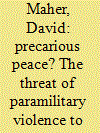|
|
|
Sort Order |
|
|
|
Items / Page
|
|
|
|
|
|
|
| Srl | Item |
| 1 |
ID:
145706


|
|
|
|
|
| Summary/Abstract |
Civil war acutely inhibits economic growth, according to a prominent set of civil war literature. However, recent scholarship observes that foreign direct investment (FDI), considered a central vehicle of growth, is entering countries with internal armed conflicts unabated. Furthermore, some civil war economies exhibit substantial increases in FDI during conflict. According to this scholarship, FDI enters conflict zones in spite of violence. This article contrastingly adopts a critical framework acknowledging the often violent characteristics of globalized capitalism. By analyzing Colombia's oil industry (the country's largest sector of FDI), this article suggests that civil war violence can create conditions that facilitate FDI inflows. More specifically, this article posits that violence perpetrated by armed groups sympathetic to the interests of the oil industry—namely the public armed forces and right-wing paramilitaries—has facilitated FDI in Colombia's oil sector. In particular, processes of forced displacement and violence against civilian groups have served to protect economically important infrastructure and have acquired land for oil exploration. Moreover, civilian groups deemed inimical to oil interests have been violently targeted. By using disaggregate-level data on the conflict in Arauca, an important oil-producing region of Colombia, this case study indicates that intensifying levels of civil war violence in areas of economic interest are followed by increases in oil production, exploration, and investment.
|
|
|
|
|
|
|
|
|
|
|
|
|
|
|
|
| 2 |
ID:
163705


|
|
|
|
|
| Summary/Abstract |
This article provides an investigation into claims that paramilitary violence in Colombia can pose a threat to the peace agreement signed in 2016 between the Colombian government and the FARC rebels. These claims highlight the capacity for paramilitary groups to ‘spoil’ the peace deal. Hitherto, however, there is a lack of scholarly research to investigate the potential of paramilitary spoiling. Firstly, this article highlights the flaws in the government’s perspective that paramilitarism no longer exists in Colombia. Instead, the government argues that Colombia is plagued by criminal bands (known as BACRIMs). Secondly, through fieldwork interviews and questionnaires conducted in FARC demobilisation camps, together with descriptive data analysed through a uniquely coded dataset on violence in western Colombia, this article supports claims that successor paramilitary groups represent a key spoiler threat to the current government-FARC peace process. On the one hand, the paramilitaries can represent a direct spoiler threat by, for instance, violently targeting demobilising FARC guerrillas. On the other hand, successor paramilitary groups represent a key indirect spoiler threat, as paramilitary violence is exacerbating the root causes of the conflict that the peace deal seeks to address, with negative implications for the prospects for peace.
|
|
|
|
|
|
|
|
|
|
|
|
|
|
|
|
|
|
|
|
|